|
|
|
Sort Order |
|
|
|
Items / Page
|
|
|
|
|
|
|
| Srl | Item |
| 1 |
ID:
168047
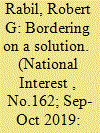

|
|
|
|
|
| Summary/Abstract |
AS THE Trump administration presses Arab countries to sign off on President Donald Trump’s Israeli-Palestinian “deal of the century” amid growing Arab polarization and vocal pessimism, little attention has been given to another sensitive regional matter that the administration has been aptly and quietly tackling. This matter revolves around the demarcation of the Lebanon-Israel maritime and land borders, which have been the focal point of skirmishes, a devastating war in 2006, and rising regional tension involving Iran and Israel.
|
|
|
|
|
|
|
|
|
|
|
|
|
|
|
|
| 2 |
ID:
132342
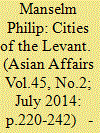

|
|
|
|
|
| Publication |
2014.
|
| Summary/Abstract |
Global cities are almost by definition somewhat detached from their geographical hinterlands. Cosmopolitan and modern, they are open to external influences from other cultures and from overseas trade. But they are also vulnerable to the rise of nationalism in the country which surrounds them, as is shown by the fate of three famous cities of the Levant, Alexandria, Smyrna and Beirut. They were multicultural trading cities, linking the economies of Europe and Asia, "windows on the world", in contrast to inland capitals like Cairo Ankara and Damascus. New global cities like London, Hong Kong and Dubai also have hybrid and polyglot inhabitants, like Levantine cities of bygone days. But they will need support if their cosmopolitanism is to prevail over nationalism.
|
|
|
|
|
|
|
|
|
|
|
|
|
|
|
|
| 3 |
ID:
159905
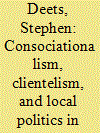

|
|
|
|
|
| Summary/Abstract |
Both liberal and corporatist consociational systems are often characterized by identity-based networks that rely on clientelism and are difficult to hold accountable. This article uses Beirut's 2015 garbage crisis and 2016 municipal elections to argue that cities can be important sites for building new civic networks because cities often have resources and frames that can be used to mobilize individuals in different ethnosectarian networks. These civic networks, by promoting ideas of citizenship and state accountability, can be a significant factor in increasing liberalism in consociational systems.
|
|
|
|
|
|
|
|
|
|
|
|
|
|
|
|
| 4 |
ID:
089138
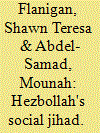

|
|
|
|
|
| Publication |
2009.
|
| Summary/Abstract |
A Beirut taxi drivers hears news that the Hezbollah-operated television station where his son and daughter-in-law work has just been bombed by Iraeli warplanes.Beirut's southern suburb is being pum-meled in response to the abduction of two Israeli soldiers by Hezbollah militants in July 2006.
|
|
|
|
|
|
|
|
|
|
|
|
|
|
|
|
| 5 |
ID:
160358
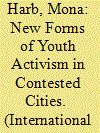

|
|
|
|
|
| Summary/Abstract |
Lebanese youth are constructed through fragmented lenses, and are recipients of partial, unresponsive, and often irrelevant policies. Despite these constraints, many youth have become actively engaged in political life, especially since 2005. Three types of youth engagement can be identified: i) the ‘conformists’, who privilege their sectarian belonging, ii) the ‘alternative groups’, who engage in professional NGOs, and iii) the new ‘activists’, who prefer loose organising centred on progressive and radical issues. New forms of youth activism in the contested city of Beirut have been able to exploit interstitial openings for seeds to grow into potentially “disruptive mobilizations”. While these resistances may have been limited up to now in time and space, youth activist groups still embarrass, hold accountable and constrain hegemonic politics. They may be generating seeds of collective action that still have to be further structured and organised.
|
|
|
|
|
|
|
|
|
|
|
|
|
|
|
|
| 6 |
ID:
172379
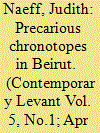

|
|
|
|
|
| Summary/Abstract |
This article argues that the intersection of time and space in large parts of the Levant is, above all, precarious. With a close analysis of two meaningful places in Beirut – the shrine of Rafic Hariri and the nightclub B018 – the article seeks to tease out how such a precarious chronotope is given form, meaning and value through narratives, practices and spatial design. Moreover, the article builds upon Walid Sadek’s conceptualisation of shared mourning as a possibility for a new sociality under Lebanon’s precarious conditions. It argues that despite their engagement with loss, the two sites under scrutiny here do not allow for such an ethical position. The findings of the analysis are relevant for the Levant more broadly as the flows of refugees in recent years have produced new and particularly precarious geographies inscribed with a profound sense of loss and grief.
|
|
|
|
|
|
|
|
|
|
|
|
|
|
|
|
| 7 |
ID:
114133
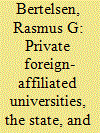

|
|
|
|
|
| Publication |
2012.
|
| Summary/Abstract |
This article contributes to the understanding of the soft power of private foreign-affiliated universities and the interaction between such universities and the state for university soft power and national soft power. The analysis shows university soft power in their Middle East host societies and its basis of academic excellence and biculturalism. Historically, university soft power has been limited first by proselytizing and later by unpopular American foreign policy. The universities have previously undescribed reverse university soft power in the USA on behalf of the Middle East: advocating Middle East interests and raising moral, political, and financial support for education, healthcare, and development in the region. The USA has pursued national soft power through the American University of Beirut and the American University in Cairo since the 1950s. University soft power has been furthered by US government financial assistance to academic excellence, while too close association with the US government has threatened university soft power. The universities have contributed to the national soft power of the USA concerning milieu goals of attraction to education, language, and liberal norms among elites. The universities have not contributed to national soft power regarding the acceptance of unpopular US foreign policies in the Middle East, which was also not a university or US government goal.
|
|
|
|
|
|
|
|
|
|
|
|
|
|
|
|
| 8 |
ID:
133830
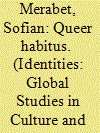

|
|
|
|
|
| Publication |
2014.
|
| Summary/Abstract |
Based on ethnographic and theoretical material, this article focuses on the interaction of queer bodies within particular urban spaces in Beirut. By highlighting bodily performances that challenge normative behaviour in contemporary Lebanon, the article makes a case for the production of a queer habitus, which finds itself expressed in different ways that all emphasise the importance of bodily and mental dispositions of queer individuals in forming their own gender and class identities.
|
|
|
|
|
|
|
|
|
|
|
|
|
|
|
|
| 9 |
ID:
178330
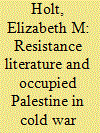

|
|
|
|
|
| Summary/Abstract |
For the last decade of his life, the Palestinian intellectual, author, and editor Ghassan Kanafani (d. 1972) was deeply immersed in theorizing, lecturing, and publishing on Palestinian resistance literature from Beirut. A refugee of the 1948 war, Kanafani presented his theory of resistance literature and the notion of “cultural siege” at the March 1967 Beirut conference of the Soviet-funded Afro-Asian Writers Association (AAWA). Articulated in resistance to Zionist propaganda literature and in solidarity with Marxist-Leninist revolutionary struggles in the Third World, Kanafani was inspired by Maxim Gorky, William Faulkner, and Mao Zedong alike. In books, essays, and lectures, Kanafani argued that Zionist propaganda literature served as a “weapon” in the war against Palestine, returning repeatedly to Arthur Koestler’s 1946 Thieves in the Night. Better known for his critique of Stalinism in Darkness at Noon (1940), Koestler was also actively involved in waging cultural Cold War, writing the United States Central Intelligence Agency’s (CIA) Congress for Cultural Freedom 1950 manifesto and helping the organization infiltrate Afro-Asian writing in the wake of Bandung. Kanafani’s 1960s theory of resistance literature thus responded at once to the psychological dislocation of Zionist propaganda fiction and the cultural infiltration of Arabic literature in the Cold War.
|
|
|
|
|
|
|
|
|
|
|
|
|
|
|
|
| 10 |
ID:
181092
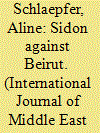

|
|
|
|
|
| Summary/Abstract |
When the State of Greater Lebanon was established in 1920, the Jewish Community Council of Beirut was officially recognized as the central administrative body within Lebanon, and although smaller communities such as Sidon and Tripoli also had their own councils they were consequently made subject to the authority of Beirut. In this context of political overhaul, I argue that some Jewish actors made use “from below” of political opportunities provided by sectarianism “from above”—or national sectarianism—to garner control over all Jewish political structures in Lebanon. But by examining in particular activities in and around the Israelite Community Council in Sidon (al-Majlis al-Milli al-Isra'ili bi-Sayda), I show how and why these attempts to practice new forms of sectarianism were met with resistance, despite connections that tied Lebanon's Jews together administratively in one community.
|
|
|
|
|
|
|
|
|
|
|
|
|
|
|
|
| 11 |
ID:
092953
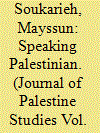

|
|
|
|
|
| Publication |
2009.
|
| Summary/Abstract |
This interview is part of a longer conversation that independent researcher Mayssun Soukarieh conducted with Rosemary Sayigh in Beirut during the summer of 2008. Sayigh, an anthropologist, oral historian, and researcher, was born in Birmingham in the United Kingdom and moved to Beirut in 1953, where she married the Palestinian economist Yusif Sayigh. She earned her master's degree from the American University of Beirut (AUB) in 1970 and was awarded a PhD from Hull University in Yorkshire in 1994. Since coming to Beirut fifty-six years ago, Sayigh has dedicated her life to writing and advocating for the Palestinians in Lebanon and elsewhere. She is the author of two groundbreaking books: Palestinians: From Peasants to Revolutionaries; A People's History (Zed Books, 1979) and Too Many Enemies: The Palestinian Experience in Lebanon (Zed Books, 1993). Although these conversations focused on Sayigh's scholarly work rather than her personal history, it became clear that the two are inextricably linked.
|
|
|
|
|
|
|
|
|
|
|
|
|
|
|
|
| 12 |
ID:
133747
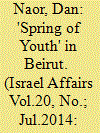

|
|
|
|
|
| Publication |
2014.
|
| Summary/Abstract |
This article examines the impact that Operation Spring of Youth, carried out by the Israel Defence Forces (IDF) on 10 April 1973 had on Lebanon. IDF Special Forces infiltrated the heart of Beirut and eliminated three senior members of the Black September organization, perpetrator of the 1972 Munich Olympics massacre. While Israelis celebrated the successful military operation, the Lebanese mourned. Following the Israeli raid, the Lebanese government resigned, and an armed conflict erupted between the Lebanese army and the Palestinian organizations, leading to both domestic and inter-Arab crises. When these clashes ended, the Lebanese government had been unable to enforce its authority over Palestinian organizations, and Lebanon's weakness was publicly exposed.
|
|
|
|
|
|
|
|
|
|
|
|
|
|
|
|
| 13 |
ID:
106949
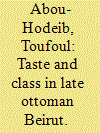

|
|
|
|
|
| Publication |
2011.
|
| Summary/Abstract |
This article deals with the material aspects of the late Ottoman home in Beirut, focusing on the notion of taste (dhawq) and its role in constructing class boundaries. It looks at how intellectuals used taste to articulate a prescriptive middle-class domesticity revolving around the woman as manager of the house and privileging moderation and authenticity in consumption habits. Rather than take such tastes as representative of actual consumption habits of an emerging middle class, and arguing for an approach that goes beyond taste as a construct, the article investigates the potentiality of new objects for subverting the existing social order. Based on a marital-conflict case brought to the Hanafi court, the article explores how one such object, a phonograph, opened interpretive possibilities in the gendered rigidity of court procedures.
|
|
|
|
|
|
|
|
|
|
|
|
|
|
|
|
|
|
|
|
|